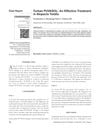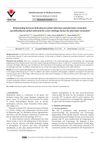 7 citations,
January 2019 in “Australasian Journal of Dermatology”
7 citations,
January 2019 in “Australasian Journal of Dermatology” A genetic marker linked to a type of hair loss was found in most patients studied.
 7 citations,
March 2017 in “Actas Dermo-Sifiliográficas”
7 citations,
March 2017 in “Actas Dermo-Sifiliográficas” Several new treatments for different types of hair loss show promise in improving patient quality of life.
 6 citations,
August 2020 in “Dermatology and Therapy”
6 citations,
August 2020 in “Dermatology and Therapy” People with Alopecia Areata often have lower vitamin D levels, and vitamin D supplements might help treat it.
 6 citations,
March 2009 in “Journal of the European Academy of Dermatology and Venereology”
6 citations,
March 2009 in “Journal of the European Academy of Dermatology and Venereology” Mexican patients had a lower incidence of skin reactions to drugs and no significant link between these reactions and the TNF2 gene variant.
 6 citations,
January 2009 in “Elsevier eBooks”
6 citations,
January 2009 in “Elsevier eBooks” The skin has multiple layers and cells, serves as a protective barrier, helps regulate temperature, enables sensation, affects appearance, and is involved in vitamin D synthesis.
 6 citations,
November 1988 in “Journal of the American Academy of Dermatology”
6 citations,
November 1988 in “Journal of the American Academy of Dermatology” The document concludes that hair analysis is not good for assessing nutrition but can detect long-term heavy metal exposure.
 5 citations,
May 2023 in “Frontiers in immunology”
5 citations,
May 2023 in “Frontiers in immunology” Environmental factors like diet and vitamin levels, especially Vitamin D, can affect autoimmune diseases differently, with lifestyle changes potentially improving outcomes.
 5 citations,
February 2022 in “Frontiers in physiology”
5 citations,
February 2022 in “Frontiers in physiology” Hair graying is influenced by factors like nerves, fat cells, and immune cells, not just hair follicles.
 5 citations,
October 2018 in “American Journal of Clinical Dermatology”
5 citations,
October 2018 in “American Journal of Clinical Dermatology” Skin problems are common after stem cell transplants, and early treatment by dermatologists can improve patient outcomes.
 5 citations,
January 2016 in “Journal of The American Academy of Dermatology”
5 citations,
January 2016 in “Journal of The American Academy of Dermatology” Skin doctors should know about skin and kidney disease links to prevent serious kidney problems.
 5 citations,
January 2016 in “Skin appendage disorders”
5 citations,
January 2016 in “Skin appendage disorders” A rare skin condition called linear lichen planopilaris caused itchy red bumps and hair loss on a man's face.
 5 citations,
August 2015 in “Bioscience, Biotechnology, and Biochemistry”
5 citations,
August 2015 in “Bioscience, Biotechnology, and Biochemistry” Obese mice with a leptin gene mutation have a longer resting phase in their hair cycle, which may help understand certain hair loss conditions.
 5 citations,
January 2010 in “International journal of trichology”
5 citations,
January 2010 in “International journal of trichology” PUVASOL might effectively treat complete scalp baldness.
 5 citations,
January 2009
5 citations,
January 2009 Betamethasone is more effective than Tacrolimus and soft paraffin for hair regrowth in patchy alopecia areata.
 5 citations,
February 2008 in “Experimental Dermatology”
5 citations,
February 2008 in “Experimental Dermatology” Cyclosporin A promotes hair growth in mice and increases a protein linked to hair growth, but it may not work the same way in humans.
 4 citations,
November 2021 in “Frontiers in endocrinology”
4 citations,
November 2021 in “Frontiers in endocrinology” Children and adults with Cushing's disease show different symptoms and males have more severe cases; surgery outcomes can be predicted by certain factors.
 4 citations,
March 2020 in “Turkish Journal of Medical Sciences”
4 citations,
March 2020 in “Turkish Journal of Medical Sciences” There may be a link between Helicobacter pylori infection and the skin condition pityriasis versicolor.
 4 citations,
May 2018 in “Journal of Neuro-Ophthalmology”
4 citations,
May 2018 in “Journal of Neuro-Ophthalmology” New treatments for relapsing multiple sclerosis are more effective and convenient but have higher risks of serious side effects.
 4 citations,
January 2018 in “Elsevier eBooks”
4 citations,
January 2018 in “Elsevier eBooks” Hormones are crucial for regulating body functions and imbalances can lead to health issues.
 4 citations,
July 2015 in “Journal of Feline Medicine and Surgery Open Reports”
4 citations,
July 2015 in “Journal of Feline Medicine and Surgery Open Reports” A cat with hair loss and illness was found to have cancer spread from its colon.
 4 citations,
November 2014
4 citations,
November 2014 The skin protects the body, regulates temperature, senses touch, and makes vitamin D.
 4 citations,
July 2012 in “Dermatologic Clinics”
4 citations,
July 2012 in “Dermatologic Clinics” New biopsy techniques and tools improve alopecia diagnosis, and both too much and too little selenium can cause hair loss.
 4 citations,
January 2012 in “Elsevier eBooks”
4 citations,
January 2012 in “Elsevier eBooks” The document concludes that various skin conditions have specific treatments, ranging from antihistamines for urticaria to surgery and medication for tumors and chronic skin diseases.
 4 citations,
November 2011 in “Archives of Dermatology”
4 citations,
November 2011 in “Archives of Dermatology” Hamilton scale imprecise, hair shaft diameter decreases, stem cell transplant regrows hair, ECP ineffective for alopecia areata universalis.
 4 citations,
September 2011 in “Expert Review of Dermatology”
4 citations,
September 2011 in “Expert Review of Dermatology” Various treatments exist for alopecia areata, but none are completely satisfactory; choice depends on age, disease extent, and preference.
 4 citations,
March 2009 in “British Journal of Dermatology”
4 citations,
March 2009 in “British Journal of Dermatology” The conference highlighted new dermatological treatments and emphasized early intervention and addressing conditions lacking evidence-based treatments.
 4 citations,
July 1994 in “Clinics in Dermatology”
4 citations,
July 1994 in “Clinics in Dermatology” Eosinophilia-myalgia syndrome, linked to contaminated L-tryptophan supplements, caused severe symptoms and some deaths, with long-term effects in survivors.
 4 citations,
January 1987 in “Annual reports in medicinal chemistry”
4 citations,
January 1987 in “Annual reports in medicinal chemistry” New treatments for skin diseases are more effective and patient-friendly, but many still lack a cure.
 3 citations,
May 2023 in “Precision clinical medicine”
3 citations,
May 2023 in “Precision clinical medicine” Researchers found four genes that could help diagnose severe alopecia areata early.
 3 citations,
June 2022 in “Dermatology and therapy”
3 citations,
June 2022 in “Dermatology and therapy” A new botanical treatment improved hair growth and symptoms in lichen planopilaris patients.





























